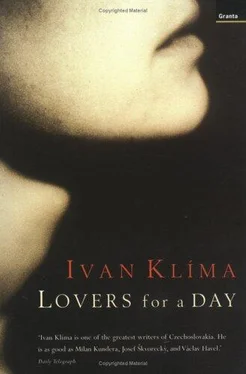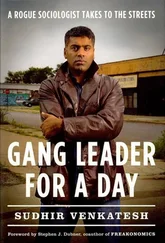There were so many cases that they soon became indistinguishable and even the people's faces slipped quickly from his memory — which was beginning to decline with age anyway. Now and then, however, a more interesting case would crop up, and a face, a name or an occupation would stick in his mind.
After one such a sitting, he emerged from the courtroom to discover the woman he had just divorced sitting opposite him on a bench in the corridor, crying.
The woman's name was Lída Vachková, a name that had immediately caught his eye because of its resemblance to his own, quite apart from the fact that the woman's distinctive, delicate beauty and her timid replies to his questions had held his attention in court. He attributed her delicacy to her profession; she was a violinist. Although it was uncharacteristic of him, he stopped in front of her and said, 'Don't cry, Mrs Vachková, no pain lasts for ever.'
She glanced up at him in surprise and quickly wiped away her tears. 'Thank you.' As she got up she started to sway and he was obliged to catch hold of her. 'Are you feeling unwell?'
'Do forgive me,' she said, 'I took some tablets this morning. To calm my nerves.'
He invited her into his chambers and fetched her a glass of water. He knew not only her name and occupation but also her age. She was twenty years his junior, very young, in his eyes, at least. He also knew the man who until a short while ago had been her husband. He too was older than she was (although at this moment he couldn't exactly recall how much older) and ran some recently established entertainment agency. A vulgar, unpleasant-looking fellow, he had apparently subjected his wife to rough and domineering treatment and had sought to curb all her interests. There were no children. They had had no problem agreeing on the division of their property — there wasn't very much anyway. The man had left the flat to his wife and moved in with his mistress.
'Do you really believe no pain lasts for ever?' she asked.
'Of course.'
'Did you ever have a pain that went away in the end?'
He was not accustomed to being cross-examined and was taken unawares. He had to stop and think for a moment
whether anything had happened in his life that had caused him a pain that had gone away. On the contrary, things in his life had tended to die gradually. Then he recalled the death of his parents. 'Even the pain of death eventually goes away,' he said evasively.
'That's true,' she conceded, 'though death is a rather special category.'
'What makes you think so?'
'Death is like the law. There is no escape from it. Whereas love. .' She seemed to be searching for a word to express the meaning of love, but instead burst into tears once again.
He helped her to her feet and saw her to the door and down the stairs. He then invited her to a nearby wine bar. He wasn't sure why, with this young woman, he was behaving in this way. There must be something about her that touched him, or that he found attractive. Or maybe there was some other reason that he was unable to put his finger on. He ordered a bottle of wine and let the woman relate her recent tribulations, although he only took in a few details; he was gazing at her hands, her fingers involuntarily toying with the napkin. They were so beautiful he wanted to clasp them or stroke them. So from time to time he would interrupt her and tell her some of the incidents he had heard about in the course of his work to reassure her that she was far from alone in her suffering.
When they parted an hour later, she invited him to a concert to be performed by the orchestra she played in. She also, naturally, invited his wife, but in the end he went to it alone. He found it impossible to concentrate on the music; his attention was focused on a single member of the orchestra — the flickering movements of her fingers and her fine bowing — and he felt an unwonted emotion. He was astounded at himself and at his
feelings, which struck him as inappropriate for someone of his age. But then it occurred to him that he had simply written off feelings from his life too soon.
He found her address and telephone number in the file.
They started to meet twice a week, initially in a café or a wine bar, fairly typically. He was aware that because of his profession she regarded him as an expert on matters of love, or rather on those cases where love was foundering, and indeed when questioned he sought to draw more general lessons from the cases that lay hidden in his memory. Even though he had little belief in the possibility of people living together in love, he realized how cautious he was in his comments, and how he could speak about something he had been unable to achieve in his own life: a relationship of mutual admiration and respect out of which tenderness grew. She listened to him with interest and even a sort of growing hopefulness. 'I expect you're good at love,' she said and gave his hand a momentary squeeze. 'You strike me as someone who can be tolerant and allow the other person some space for themselves.'
He nodded, pleased that she should think of him in that way.
Then she invited him home.
She lived in a tiny attic room and as he walked up the many stairs (the house had no lift) his legs were buckling under him from excitement or maybe anxiety at what was certainly about to happen.
The little room had sloping walls and almost no furniture, just a wardrobe, a music stand, two chairs and a large divan beneath a skylight. They made love underneath that window.
She seemed slim and finely built compared to his wife and her skin was smooth, without a single fold or wrinkle. To his surprise, he found tender words for her. She listened to him
and he had barely stopped speaking when she said, 'More please. I want more of those words.' As he was leaving she asked, 'Will we see each other again some time?' And he assured her that he would certainly be back soon.
And so he would visit her, bringing her flowers, wine and words of tenderness. They never spoke about her former marriage, and he mentioned his wife only occasionally, and always in a way that let her assume that his marriage was not particularly happy. As usually happens when information comes from one side only, she would conclude, had she made the effort, that the fault lay with his wife.
On one occasion, when they were again lying beneath the skylight onto which the heavy drops of a spring downpour were falling, she asked him, 'Do you love your wife at all?'
He said he didn't, that he hadn't loved her for many years.
Then for a long time neither of them said anything. She cuddled up to him as he stroked her flanks and her belly, the softness of her skin exciting him as always.
'What's the point of such a marriage, Martin?' she asked abruptly.
The question caught him unprepared. It had never occurred to him that he might leave his wife after thirty years of living together, not even now, as he lay at the side of a woman he had just made love to. He had long ceased wondering what bound him to his wife Marie. Habit perhaps. So many shared days and nights. Memories that now felt like stories about someone else. Maybe the chairs they sat on, or the familiar odour that wafted towards him the moment he opened the door of their flat. Maybe the sons they had reared.
'You don't have to tell me if you don't want to,' she said.
'Maybe,' it occurred to him, 'so that when I come home in foul weather like this I can say to someone, "It's raining out".'
'Yes, that's a good reason,' she said, drawing away from him slightly.
As he was leaving she didn't ask, as she usually did, when they 'would see each other again. So he asked instead.
'Maybe never,' she said. Even so she leaned towards him and kissed him.
On his way downstairs it occurred him that she had been expecting a different response, that he had mistaken the meaning of her question. She had been wanting to hear whether he was prepared to leave his wife for her.
Читать дальше












